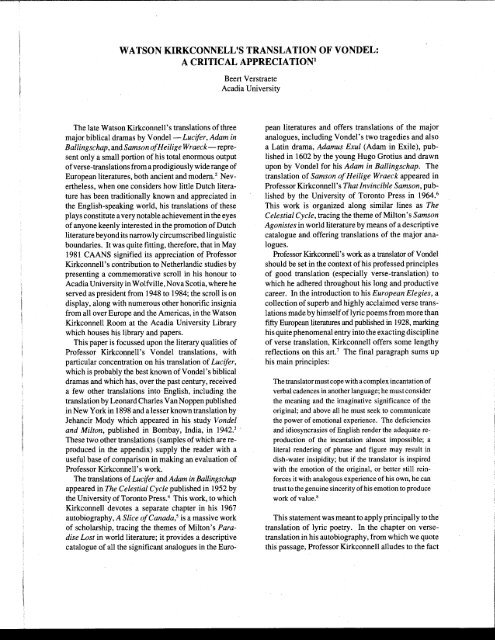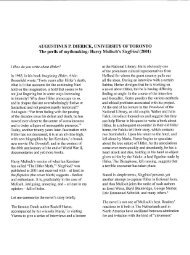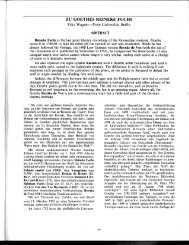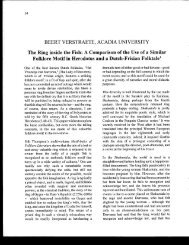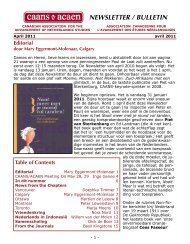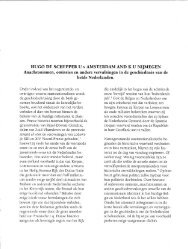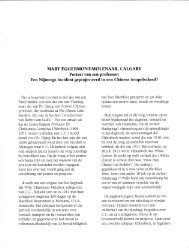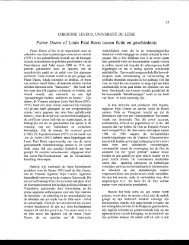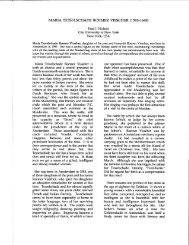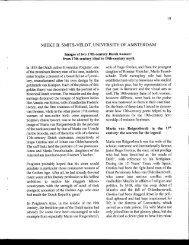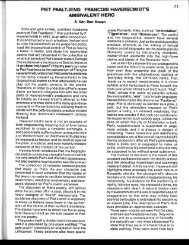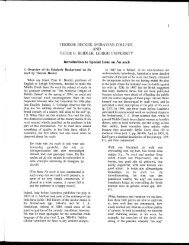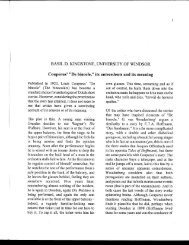watson kirkconnell's translation of vondel - canadian association for ...
watson kirkconnell's translation of vondel - canadian association for ...
watson kirkconnell's translation of vondel - canadian association for ...
You also want an ePaper? Increase the reach of your titles
YUMPU automatically turns print PDFs into web optimized ePapers that Google loves.
2 Canadian Journal <strong>of</strong> Netherlandic Studies<br />
that it was his special personal situation, namely the<br />
death <strong>of</strong> his wife in childbirth in 1925, that lent such a<br />
powerful emotional inspiration to the composition <strong>of</strong><br />
the European Elegies, which was dedicated to her<br />
memory.9 However, such inspiration no longer applied<br />
to the work <strong>of</strong> verse <strong>translation</strong> he undertook<br />
subsequently: "The impulse <strong>of</strong> kindred emotion was<br />
gone, and in any case I had come to realize that<br />
emotion was not enough."IO This was especially true<br />
because he was now beginning to tackle quite different<br />
verse-<strong>for</strong>ms such as narrative verse or verse drama.<br />
Kirkconnell recalls that, in order to obtain a firmly<br />
grounded pr<strong>of</strong>iciency in verse-<strong>translation</strong>, it was necessary<br />
<strong>for</strong> him to acquire a through mastery <strong>of</strong> the rules<br />
and principles <strong>of</strong> metrics and versification that had<br />
been developed in the history <strong>of</strong> Englisl:I literature; and<br />
that, <strong>for</strong> this reason, he made a close study <strong>of</strong> the great<br />
poets, Chaucer, Spenser, Shakespeare, Dryden, and<br />
Byron. ll Pr<strong>of</strong>essor Kirkconnell always remained rather<br />
conservative as a verse-translator and was quite critical<br />
<strong>of</strong> the freer and looser style <strong>of</strong> <strong>translation</strong> pioneered<br />
in the English-speaking world by Ezra Pound. In the<br />
same chapter on verse-<strong>translation</strong>, he refers with approval<br />
to the three major postulates <strong>of</strong> trans,lation that<br />
were put <strong>for</strong>th by Alexander Fraser Tytler in his Essay<br />
on the Principles <strong>of</strong> Translation, which he read to the<br />
Royal Society <strong>of</strong> Edinburgh in 1790. These are: a) the<br />
<strong>translation</strong> must not omit any part <strong>of</strong> the original; b) the<br />
style and manner <strong>of</strong> the <strong>translation</strong> must reproduce<br />
those <strong>of</strong> the original; and c) the <strong>translation</strong> should have<br />
all the ease <strong>of</strong> the original poetry.12 But <strong>of</strong> the<br />
methodology <strong>of</strong> <strong>translation</strong> espoused by Ezra Pound<br />
and his school, Kirkconnell speaks as follows: "In this<br />
new school, Tytler's first two principles are tossed out<br />
<strong>of</strong> the window and the primary aim is to produce a<br />
substantially new poem, demonstrating the brilliance<br />
<strong>of</strong> the 'translator' but not necessarily reproducing the<br />
meaning or the manner <strong>of</strong> the original."13 Kirkconnell's<br />
ideal <strong>of</strong> verse-<strong>translation</strong>, indeed <strong>of</strong> all literary<br />
<strong>translation</strong>, may be best summed up by the phrase<br />
'faithfulness to the original'. Such a fidelity to the<br />
original text, <strong>of</strong> course, should not be confused with<br />
literal <strong>translation</strong>, which will frequently do violence to<br />
the target-language, especially if that language is very<br />
different from the source-language in its linguistic and<br />
literary characteristics and in its socio-cultural setting,<br />
as is the case, <strong>for</strong> instance, with English and classical<br />
Latin. Even"between English and Dutch, especially<br />
the seventeenth-century baroque Dutch <strong>of</strong> Vondel, the<br />
dissimilarities are sufficiently great to rule out any<br />
"possibility <strong>of</strong> literal or at any rate fairly close <strong>translation</strong><br />
that has the ease <strong>of</strong> original poetry.<br />
However, while Kirkconnell can be called fairly<br />
conservative in his methodology as a verse-translator,<br />
his work does certainly reflect one <strong>of</strong> the most noteworthy<br />
and, in my judgment, genuinely progressive<br />
changes that has taken place in the theory and practice<br />
<strong>of</strong> verse-<strong>translation</strong> in the course <strong>of</strong> this century,<br />
namely the large-scale abandonment <strong>of</strong> the highly<br />
archaic poetic idiom which was de rigueur in the<br />
English-speaking world <strong>for</strong> such a long period <strong>of</strong> time.<br />
This change was undoubtedly the effect <strong>of</strong> the radical<br />
and far-reaching developments that took place in the<br />
style and manner <strong>of</strong> English poetry during the first half<br />
<strong>of</strong> this century. As a classicist, I see the fact <strong>of</strong> a new,<br />
more contemporary idiom <strong>of</strong> <strong>translation</strong> most strikingly<br />
demonstrated in the great outpouring <strong>of</strong> fresh<br />
<strong>translation</strong>s that have been made, <strong>for</strong> the past half<br />
century or so, <strong>of</strong> the Greek and Roman classics:<br />
compare, <strong>for</strong> instance, the <strong>translation</strong>s <strong>of</strong> Greek tragedy<br />
by Gilbert Murray early in this century 14 with<br />
almost any <strong>translation</strong> that has been made over the past<br />
few decades - one can indeed speak here <strong>of</strong> a revolution<br />
in verse <strong>translation</strong>. Kirkconnell does not entirely<br />
abandon the older poetic idiom, but his language is<br />
generally less archaic than that <strong>of</strong> Van Noppen and<br />
Mody.<br />
As I have already indicated, Pr<strong>of</strong>essor Kirkconnell<br />
attached great importance to the verse translator's<br />
technical mastery <strong>of</strong> all the metrical resources available<br />
in the target language, and in the chapter on verse<br />
<strong>translation</strong> in his autobiography, he discusses at length<br />
the considerable challenge in finding suitable renderings<br />
<strong>for</strong> the wide variety <strong>of</strong> metrical principles and<br />
structures he encountered in his source-languages. IS<br />
Although he does not explain in detail his decision to<br />
render the large majority <strong>of</strong> Vondel's French-style<br />
alexandrine couplets in blank verse, he implies that a<br />
use <strong>of</strong> the original metrical scheme would have been<br />
too constricting <strong>for</strong> his <strong>translation</strong>. 16 His choice <strong>of</strong><br />
blank verse was, I believe, a sound one. The use <strong>of</strong><br />
rhyming couplets in English slips too easily into creating<br />
a ballad-like effect which is not always appropriate<br />
<strong>for</strong> narrative verse and even less appropriate <strong>for</strong> verse<br />
tragedy. When used with great skill and verve, as, <strong>for</strong><br />
instance, by Alexander Pope in his The Rape <strong>of</strong> the<br />
Lock and Essay on Man, the heroic couplet can be<br />
effective stylistically as a device <strong>of</strong> wit and pointedness,<br />
but in most narrative verse and verse drama such<br />
a literary effect is not called <strong>for</strong> in any sustained<br />
manner. In VondeI's rhymed alexandrines, the rhyme<br />
functions as a purely <strong>for</strong>mal rhythmic device contributing<br />
to the requisite stately flow <strong>of</strong> the language in<br />
both dialogue and monologue. Such a rhythmic flow
4 Canadian Journal <strong>of</strong> Netherlandic Studies<br />
James B. Snelson, Morning in His Heart: The Life and<br />
Writings <strong>of</strong> Watson Kirkconnell, Hantsport: Lancelot<br />
Press, <strong>for</strong> Acadia University Library 1986.<br />
3Vondel's Lucifer, translated by Leonard Charles Van<br />
Noppen, New York & London: Continental Publishing<br />
Co., 1898; Jehancir P.R. Mody, Vondel and Milton,<br />
Bombay: K. & I. Cooper Educational Publishers, 1942.<br />
A fresh <strong>translation</strong> <strong>of</strong> Lucifer, written by Noel Clark, was<br />
used <strong>for</strong> a per<strong>for</strong>mance in London, England in the<br />
summer <strong>of</strong> 1987, but un<strong>for</strong>tunately, has not been<br />
published' as yet.<br />
4Watson Kirkconnell, The. Celestial Cycle, Toronto:<br />
University <strong>of</strong> Toronto Press, 1952.<br />
SWatson Kirkconnell, A Slice <strong>of</strong> Canada, Toronto:<br />
University <strong>of</strong> Toronto Press <strong>for</strong> Acadia University, 1967,<br />
ch. 17, "The Milton Project."<br />
6Watson Kirkconnell, That Invincible Samson, Toronto:<br />
University <strong>of</strong> Toronto Press, 1964.<br />
7Watson Kirkconnell, European Elegies, Ottawa, Graphic<br />
Publishers, 1928. For a detailed discussion <strong>of</strong><br />
Kirkconnell's methodology <strong>of</strong> verse <strong>translation</strong>, see the<br />
excellent article by I.R.C. Perkin in The Journal <strong>of</strong> the<br />
Atlantic Provinces Linguistic Association 5 (1983), 16-32.<br />
8European Elegies, 24.<br />
9A Slice <strong>of</strong> Canada, 71.<br />
IOlbid.<br />
IIlbid<br />
12lbid., 70.<br />
\3lbid.<br />
14For critical evaluation, including T.S. Eliot's acerbic<br />
comments, <strong>of</strong> Gilbert Murray's <strong>translation</strong>s <strong>of</strong> Greek<br />
tragedy, see Duncan Wilson, Gilbert Murray OM 1866-<br />
1957, Ox<strong>for</strong>d: Clarendon Press, 1987, 195-200.<br />
15A Slice <strong>of</strong> Canada, 71ff.<br />
16Ibid., 72.<br />
17lbid., 224.<br />
18The Dutch text is taken from Vondel: Volledige<br />
Dichtwerken en Oorspronkelijk Proza, ed. Albert Verwey,<br />
Amsterdam: H. I. W. Brecht, 1937. For a sample <strong>of</strong><br />
(generally favourable) Dutch critical reaction to<br />
Kirkconnell's The Celestial Cycle and That Invisible<br />
Samson, including the <strong>translation</strong>s <strong>of</strong> Vondel, see the<br />
reviews by W.A.P. Smit in De Nieuwe Taalgids 1954,<br />
111-114 and 1985, 337-340.


